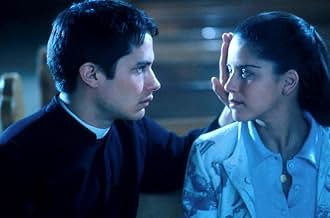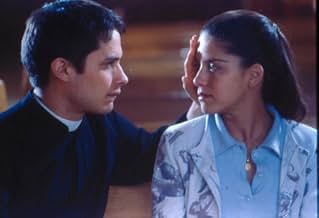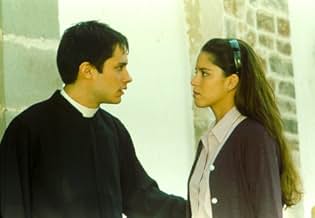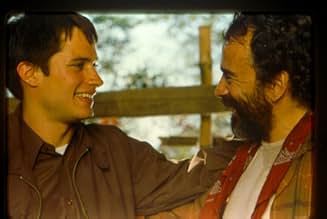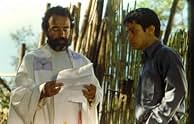VALUTAZIONE IMDb
6,7/10
14.803
LA TUA VALUTAZIONE
Aggiungi una trama nella tua linguaPolitics and sexual passions threaten to corrupt a young, newly-ordained priest in a small Mexican town.Politics and sexual passions threaten to corrupt a young, newly-ordained priest in a small Mexican town.Politics and sexual passions threaten to corrupt a young, newly-ordained priest in a small Mexican town.
- Regia
- Sceneggiatura
- Star
- Candidato a 1 Oscar
- 21 vittorie e 15 candidature totali
Pedro Armendáriz Jr.
- Presidente Municipal Gordo
- (as Pedro Armendáriz)
Recensioni in evidenza
I enjoyed this movie, not because it was gripping or exciting, but because of what it had to say.
I'm not completely aware of everything to do with the Catholic Church, but the controversy in this movie is a necessary one.
I've never seen a Gael Garcia movie before and I thought this was good. The most powerful part of the movie is what it leaves you with - the message at the end; the themes of confession, of sin, of mistakes, of being human.
If you can't watch something that is quite slow and is not edge of the seat stuff, then forget it. Even the music isn't very memorable. But the movie stuck in my mind.
I'm not completely aware of everything to do with the Catholic Church, but the controversy in this movie is a necessary one.
I've never seen a Gael Garcia movie before and I thought this was good. The most powerful part of the movie is what it leaves you with - the message at the end; the themes of confession, of sin, of mistakes, of being human.
If you can't watch something that is quite slow and is not edge of the seat stuff, then forget it. Even the music isn't very memorable. But the movie stuck in my mind.
Based on an 1875 Portuguese novel by Eca de Quieros, The Crime of Father Amaro, the new film from director Carlos Carrera, has been updated to modern Mexico. As it opens, Father Amaro (Gael García Bernal) comes to Las Reyes for his first assignment. He starts out as an idealist, showing kindness to a fellow bus passenger whose money is stolen during a holdup, but when he arrives at the parish, he quickly caves in to the established order.
Father Benito (Sancho Gracia) is his superior, and his main project is the building of a hospital, orphanage, and rest home. It is soon learned that Benito is having an affair with a local café proprietor Sanjuanera (Angélica Aragón) and has taken money from the area's major drug lord to finance the hospital. Benito is also a vocal opponent of the "good" priest, Father Natalio (Damían Alcázar) whose support of the peasants and their guerilla revolution stirs resentment from the church hierarchy.
When a reporter for the local paper is given photographs of Father Benito at a baptism with the drug kingpin, he writes an article alleging that the hospital is a front for laundering drug money. The bishop urges Father Amaro to write a rebuttal (i.e., a cover-up) in the paper saying that the funds came only from the church. Amaro then has an affair with the reporter's ex-girlfriend, Sanjuanera's young daughter Amelia (Ana Claudia Talancón), and in an awkward scene, the priest drapes her in a blue robe that has been designed for the local church's statue of the Virgin Mary. "You're more beautiful than the blessed virgin," he tells her. The result of this liaison is a scandal that rocks the church.
The Catholic Church has called for a boycott of The Crime of Father Amaro on religious grounds. Personally, I'm more concerned with its artistic transgressions. The film provides little insight into the conflicting pressures that priests face in today's world, and the characters are shallow and uninteresting. Given recent headlines about sexual abuse, this issue could have been the focus for an important film, but Carrera hits us over the head with his message so often that the film ends up as manipulative melodrama, light years away from the subtle ironic thrusts of a Buñuelian sword.
Father Benito (Sancho Gracia) is his superior, and his main project is the building of a hospital, orphanage, and rest home. It is soon learned that Benito is having an affair with a local café proprietor Sanjuanera (Angélica Aragón) and has taken money from the area's major drug lord to finance the hospital. Benito is also a vocal opponent of the "good" priest, Father Natalio (Damían Alcázar) whose support of the peasants and their guerilla revolution stirs resentment from the church hierarchy.
When a reporter for the local paper is given photographs of Father Benito at a baptism with the drug kingpin, he writes an article alleging that the hospital is a front for laundering drug money. The bishop urges Father Amaro to write a rebuttal (i.e., a cover-up) in the paper saying that the funds came only from the church. Amaro then has an affair with the reporter's ex-girlfriend, Sanjuanera's young daughter Amelia (Ana Claudia Talancón), and in an awkward scene, the priest drapes her in a blue robe that has been designed for the local church's statue of the Virgin Mary. "You're more beautiful than the blessed virgin," he tells her. The result of this liaison is a scandal that rocks the church.
The Catholic Church has called for a boycott of The Crime of Father Amaro on religious grounds. Personally, I'm more concerned with its artistic transgressions. The film provides little insight into the conflicting pressures that priests face in today's world, and the characters are shallow and uninteresting. Given recent headlines about sexual abuse, this issue could have been the focus for an important film, but Carrera hits us over the head with his message so often that the film ends up as manipulative melodrama, light years away from the subtle ironic thrusts of a Buñuelian sword.
From a novel by the 19th century Portuguese well-known novelist Eça de Queirós, the Mexican director Carlos Carrera made this good movie in which to the main ingredients present at all times everywhere (lust, the temptations of the flesh haunting Catholic priests, religious hypocrisy, love and bourgeois prejudices) he added specific Mexican ones of our times such as the fight for independent journalism, drug traffic, complicity of authorities and the fight of the peasants for dignity, freedom and a better life. He was very successful in telling the same story contained in the Portuguese novel, transposing it from the atmosphere of a Portuguese provincial town in the second half of 19th century to rural Mexico of present times. The acting of all performers is sober and efficient with special prominence to Ana Claudia in the role of the sensual nymphet who seduces the young priest not with great difficulty it must be said.
In my opinion, the best thing about El Crimen del Padre Amaro is Vicente Leñero's script - updating a story from 1875 without losing the magic scenes created by Eça de Queiroz so long ago. Gael Garcia Bernal keeps proving that his talent is solid and we can expect much more from him in the future. Another good surprise is Ana Claudia Talancón, not only for her astonishing beauty, but also for a great performance as Amelia. The cast is very good and the plot, yet polemical, gives a lot to think. Again, by updating the old Portuguese story to a contemporary Mexico and inserting current issues like the relation between church and drug dealers, El Crimen del Padre Amaro raises some relevant questions about celibate, religious ethics and hypocrisy. As written in 1875, "loneliness is the greatest sin".
`El Crimen' was not a bad film, although it was hardly worthy of accolades. While the acting was passable, the story did not move along in a provocative enough manner to thoroughly captivate its audience-- in simple terms, the movie was somewhat slow.
What is interesting to notice is the reaction that the public-- especially the Catholic public-- has had to this film. As a Catholic, it saddens me to see the amazing amount of rage focused around the lust of the film's central character, Padre Amaro. The film, on a superficial level, was rebellion against stale relics of Catholic tradition-- such as requisite chastity for clergy and the deification of inanimate objects-- that may well spell the end of the faith if they are not shed. It is on these superficial levels that Padre Amaro is decried as a criminal of the faith by the viewing public, but lust is not this priest's true crime.
Central to the film's controversy is the corruption that propels the church. The truest crime of the film is the web of cover-ups and lies that the church creates in order to propagate its cause. The church is held deep in the pockets of the drug cartel and in order to maintain their stability, the majority of the church leadership, from the bishop down to the sacristans,
are quite comfortable with, at worst, lying and falsifying evidence or, at best, looking the other way. The crime of Padre Amaro is not so much that he acted upon his human impulses as that he accepts the corruption of the church by participating in its lies and creating lies of his own.
Unfortunately, this film's only exposé is not the corruption of the church, which has become more and more evident in recent times, but the faithful church body's willingness to pretend that none of this goes on. One of the most terrifyingly ironic cries of foul against this film, as evidenced in many of these reviews, is, `Priests would never act that way!' How can one, in today's climate, make such assertions? While this film should, in an ideal world, be objectionable, the current outcry by supposedly devout Catholics represents a denial of epidemic proportions.
If one would set aside one's group think for two hours while watching this film, one might gain a perspective of the church that our priests do not offer in their Sunday morning Masses. This film may not represent what we would like our church to be, but it does represent what our church is. If we continue to pretend that the current state of affairs of our faith is acceptable, then el crimen de Padre Amaro will also be our crime: complacence.
What is interesting to notice is the reaction that the public-- especially the Catholic public-- has had to this film. As a Catholic, it saddens me to see the amazing amount of rage focused around the lust of the film's central character, Padre Amaro. The film, on a superficial level, was rebellion against stale relics of Catholic tradition-- such as requisite chastity for clergy and the deification of inanimate objects-- that may well spell the end of the faith if they are not shed. It is on these superficial levels that Padre Amaro is decried as a criminal of the faith by the viewing public, but lust is not this priest's true crime.
Central to the film's controversy is the corruption that propels the church. The truest crime of the film is the web of cover-ups and lies that the church creates in order to propagate its cause. The church is held deep in the pockets of the drug cartel and in order to maintain their stability, the majority of the church leadership, from the bishop down to the sacristans,
are quite comfortable with, at worst, lying and falsifying evidence or, at best, looking the other way. The crime of Padre Amaro is not so much that he acted upon his human impulses as that he accepts the corruption of the church by participating in its lies and creating lies of his own.
Unfortunately, this film's only exposé is not the corruption of the church, which has become more and more evident in recent times, but the faithful church body's willingness to pretend that none of this goes on. One of the most terrifyingly ironic cries of foul against this film, as evidenced in many of these reviews, is, `Priests would never act that way!' How can one, in today's climate, make such assertions? While this film should, in an ideal world, be objectionable, the current outcry by supposedly devout Catholics represents a denial of epidemic proportions.
If one would set aside one's group think for two hours while watching this film, one might gain a perspective of the church that our priests do not offer in their Sunday morning Masses. This film may not represent what we would like our church to be, but it does represent what our church is. If we continue to pretend that the current state of affairs of our faith is acceptable, then el crimen de Padre Amaro will also be our crime: complacence.
Lo sapevi?
- QuizThis movie began creating controversy even before it was released. Several groups, most of them related to the church, tried to ban it. They did not succeed; instead, tickets were sold out on opening weekend.
- BlooperAmaro gets beaten up by Ruben and receives some bruises in his face. A little later, when he meets Amelia in the church, the bruises are gone.
- Citazioni
Father Amaro: Tell me your sins, child.
Amelia: You already know them. And your sins?
- Curiosità sui crediti"In memoriam Paco Rabal"
- ConnessioniFeatured in The 60th Annual Golden Globe Awards (2003)
I più visti
Accedi per valutare e creare un elenco di titoli salvati per ottenere consigli personalizzati
- How long is The Crime of Padre Amaro?Powered by Alexa
Dettagli
- Data di uscita
- Paesi di origine
- Siti ufficiali
- Lingua
- Celebre anche come
- The Crime of Padre Amaro
- Luoghi delle riprese
- Aziende produttrici
- Vedi altri crediti dell’azienda su IMDbPro
Botteghino
- Budget
- 1.800.000 USD (previsto)
- Lordo Stati Uniti e Canada
- 5.717.044 USD
- Fine settimana di apertura Stati Uniti e Canada
- 504.681 USD
- 17 nov 2002
- Lordo in tutto il mondo
- 26.996.738 USD
- Tempo di esecuzione
- 1h 58min(118 min)
- Colore
- Mix di suoni
- Proporzioni
- 1.85 : 1
Contribuisci a questa pagina
Suggerisci una modifica o aggiungi i contenuti mancanti







